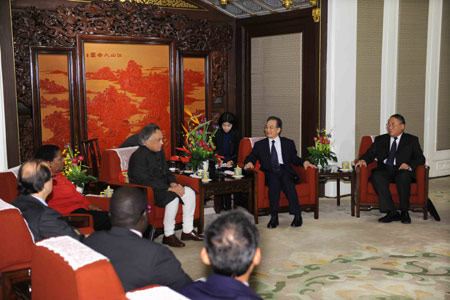Wu Changhua, the Greater China director of the Britain-headquartered non-governmental organization Climate Group, deemed it as "a significant and meaningful step," Though, he accepts that "The cost (in achieving the emissions cut target) will be huge."
The ENGOs (Environmental Non-Governmental Organisations) shaw target declared by China as "greater contribution" to the world in addressing climate change, Chen Ying, a senior research fellow of the Research Center for Sustainable Development under the Chinese Academy of Social Sciences (CASS), told Xinhua.
However, Qi Jianguo (an economist also with the CASS) see the the target as "great pressure" on China's development. He further highlights that in 2020, China's gross domestic product will at least double that of now, so will emissions of greenhouse gases. But the target means the emissions in 2020 have to be roughly equivalent to the present level. Thus, it will presents a great challenge before China.
Wu said China had already closed down many small energy-consuming thermal power plants, without complaining to the international community or seeking international financial support.
Therefore, it's quite, Wu further says, difficult to cut more emissions so long as the most inefficient plants have been stopped and technological upgrading for existing plants would cost a lot.
(Interview from Xinhua)
![Wang Chen, minister in charge of the State Council's Information Office, made a speech at the symposium.[China.org.cn] Wang Chen, minister in charge of the State Council's Information Office, made a speech at the symposium.[China.org.cn]](http://images.china.cn/attachement/jpg/site1007/20091127/0019b93bd68d0c7983e401.jpg)

![This photo, taken on November 2, shows a giant statue of Chairman Mao Zedong under construction in Changsha, the capital of South China's Hunan Province. When complete, the sculpture, which is 32 meters in height and covers an area of 2300 square meters, will be the largest statue of Mao Zedong in China. The pedestal of the sculpture, 15 meters high, 83 meters long and 41 meters in width, will house a Mao Zedong Memorial Hall and exhibition room. [CFP] This photo, taken on November 2, shows a giant statue of Chairman Mao Zedong under construction in Changsha, the capital of South China's Hunan Province. When complete, the sculpture, which is 32 meters in height and covers an area of 2300 square meters, will be the largest statue of Mao Zedong in China. The pedestal of the sculpture, 15 meters high, 83 meters long and 41 meters in width, will house a Mao Zedong Memorial Hall and exhibition room. [CFP]](http://images.china.cn/attachement/jpg/site1007/20091103/000bcdb95f1d0c59e45f02.jpg)